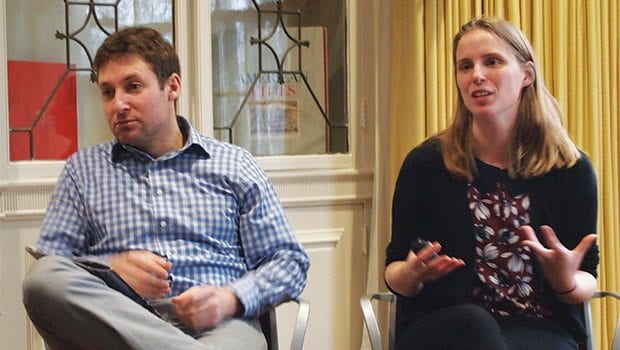Menino Survey of Mayors shows poverty, inclusion of minorities high concerns for many mayors

Last week, researchers from Boston University’s Initiative on Cities, co-founded by late Boston Mayor Thomas M. Menino, discussed their latest research on the priorities and concerns of America’s mayors with a small group gathered at their BU headquarters.
On the web
2016 Menino Survey of Mayors: http://bit.ly/2kd5Z49
They presented the third annual Menino Survey of Mayors report, which reflects survey responses made during the summer of 2016 from a representative sampling of more than 100 mayors nationwide. In the survey, mayors expressed greater concern about poverty than they did two years prior, and many mayors said they need to do more to include poor residents and minorities.
Diversity
Many mayors highlighted the importance of diversity for making their cities creative and innovative as well as attractive to new businesses and able to retain current ones. However, they also said there is far to go to until all residents are sufficiently served and included.
When asked to select the top two benefits of diversity from a list of options, two-thirds of mayors chose creativity and innovation and one-third selected benefit to current businesses. More than a quarter of surveyed mayors said diversity helped attract new businesses.
While diversity was valued, much work needs to be done to make cities truly inclusive, respondents said. Half of surveyed mayors said black residents were one of the top two most marginalized groups in their city, and over a quarter said Latinos were their most marginalized group. Roughly one-fourth of mayors also said that minorities are among the sectors least trusting of government.
In contrast to specific policy proposals they presented for how to address the needs of the poor, when it came to serving minorities better, mayors’ ideas were vague, said Katherine Levine Einstein, a BU assistant professor of political science and one of the report’s authors.
Survey respondents largely said the way to be more inclusive of black residents is to better engage them with government, acknowledge publicly black residents’ contributions and improve outreach to members of the black community. Mayors also suggested changes such as increasing Spanish translation services and forging more visible and direct ties to black leaders and residents.
“They [mayors] talked about better including them in city dialogues, but we didn’t get specifics,” Einstein said.
Mayors also had difficulty pointing to a city that demonstrated effective handling of issues of race and inclusion. Few of the 100-plus mayors named the same city for this question, according to the report.
Poverty
Representing a departure from survey responses of the past two years, mayors expressed strong concern over poverty and income inequality, Levine said. Mayors in 2016 were 10 percent more likely to list socioeconomic issues among their top two policy priorities than they were in 2014.
Specific issues cited included the difficulty for those without college degrees to attain middle-class jobs and a lack of living wage jobs, and 48 percent of mayors said those living in poverty are “under-included.”
Twenty percent of mayors said addressing housing concerns was the top most important approach to serving the needs of those in poverty, and another twenty percent prioritized education. To a lesser extent, survey responders agreed that skills training, job training and improved access to city services are important focuses.
Levels of government
With high levels of partisanship having gripped the federal government, progressive advocates appeared to be looking increasingly to the local level as a way to make an impact, Levine said. In some cases, city leaders seemed to think that if they did not take a stand on certain issue, no other unit of government would do so.
However, mayors also faced limits on the types of issues they could affect and the extent to which they could address them. For instance, in some states, mayors who sought to enact environmental protections or minimum wage increases were prevented from doing so by laws imposed at the state level, and mayors also cited dependence on federal assistance in areas such as economic development, poverty alleviation and infrastructure and housing investment, the report stated.
“While much of the contemporary media rhetoric surrounding local governments suggests that cities are forced to tackle significant policy programs as a consequence of federal and state intransigence, a combination of fiscal and regulatory constraints may limit independent mayoral (and city) activism to more modest policy agendas,” the report noted.
Many mayors surveyed expressed hopes that the next president would bring investments in mass transportation, roads, bridges and other infrastructure.






